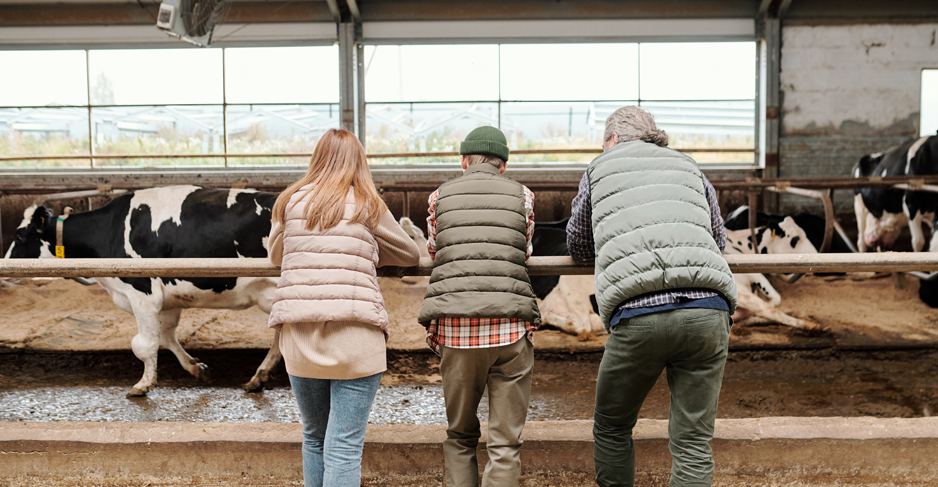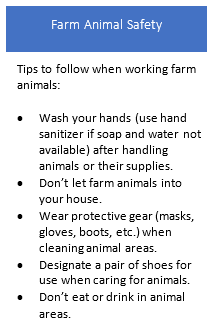Farm Animal Emergency Preparedness
Posted on by
June is National Pet Preparedness Month.
Raising farm animals can bring lots of joy and is a great learning opportunity for families. However, they can have special needs when it comes to preparing for emergencies. Their owners should make sure they have a plan before a disaster happens.
Plan ahead to keep animals safe
Plan ahead to keep your animals safe and healthy during an emergency. Think of their unique needs when creating an emergency action plan.
Horses
From pulling a plow over a farmer’s field to carrying a cowboy across the open range, horses have always had an important role in society. Today, horses are generally considered companion animals. Close to 2 million U.S. households report owning a horse.(1)
Planning ahead for emergencies is important if you own horses because of their size and transportation needs. Do not wait until there’s an emergency to figure out where you will transport or how you will care for your horses.
The American Veterinary Medical Association suggests that owners of horses take preparedness steps to:
- Permanently identify each horse with a tattoo, microchip, brand, or photograph. Keep information about your horse’s age, sex, breed, and color with your important paperwork.
- Keep halters ready for your horses. Attach a luggage tag with your horse’s name; your name, email address, and telephone number; and a second emergency telephone number to each halter.
- Collect and protect veterinary records, identification photos, and health information. Store this important paperwork in a watertight envelope. Keep it with your family’s other important papers in a safe place that is easy to access.
- Make plans to trailer your horse during an emergency. Find someone to help evacuate your horses if you don’t have your own trailer or enough room in your trailer for horses.(2)
Backyard poultry
Raising backyard poultry is an increasingly popular pastime. Many people keep poultry, which includes chicken, ducks, geese, guinea fowl, and turkeys, for eggs or for meat. Take steps to keep your backyard poultry healthy, safe, and calm during an emergency(2):
- Keep enough feed and water to last a week. Store food in a dry area 2 feet above the ground.
- Take photos of your birds to help with identification in case they escape or get lost.
- Complete an emergency action plan that includes contact information for your veterinarian.
- Take steps to secure and weatherproof their coop by lining it with newspapers or other absorbent bedding material. Never bring poultry in the kitchen, dining room, or other areas where food is handled or consumed.
Livestock
Livestock can refer to animals like horses, cattle, sheep, goats, and pigs. Livestock owners should be prepared to protect their herds during an emergency. Having a plan in place can help you stay calm in an emergency.
Evacuation planning
If your emergency action plan is to evacuate with your animals, use the time before and between events to prepare. Act now to get some form of identification for every animal, reach out to experienced handlers who can help during an emergency, and gather enough food and water for each animal.(4) Have a shelter-in-place plan if evacuating your animals isn’t an option.
Sheltering in place
Although owners may plan for emergency evacuation of farm animals, this may not be possible. You may need to decide to move animals to a structure for protection or let them out to pasture.(2) It’s a decision that depends on the type of disaster and the amount of time you have to decide. State departments of agriculture and county extension services can help you with planning ahead.
Visit the CDC website for more information on how to prepare your pets and other animals for emergencies.
References
- https://www.cdc.gov/healthypets/pets/horses.html
- https://www.avma.org/resources/pet-owners/emergencycare/large-animals-and-livestock-disasters
- https://www.ready.gov/pets
Resources
- AMVA Large animals and Livestock in disasters
- UNM Livestock Preparedness
- USDA Protecting livestock during disaster
Thanks in advance for your questions and comments on this Public Health Matters post. Please note that the CDC does not give personal medical advice. If you are concerned you have a disease or condition, talk to your doctor.
Have a question for CDC? CDC-INFO (http://www.cdc.gov/cdc-info/index.html) offers live agents by phone and email to help you find the latest, reliable, and science-based health information on more than 750 health topics.
4 comments on “Farm Animal Emergency Preparedness”
Comments listed below are posted by individuals not associated with CDC, unless otherwise stated. These comments do not represent the official views of CDC, and CDC does not guarantee that any information posted by individuals on this site is correct, and disclaims any liability for any loss or damage resulting from reliance on any such information. Read more about our comment policy ».


🙏🙏
In case of an emergency, I will be eating my poultry.
It’s such a very good topic regarding animal health……
Very Nice and Informative Blog you have shared with us.